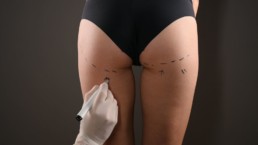Do Breast Lift Results Last for Life?

One common question that many women have about breast lifts is whether or not the results are permanent. How long does a breast lift last? The answer to this question is a bit complicated. In general, the results of a breast lift will last for many years, but they will not be permanent. Let’s take a closer look at what this means for you.
Breast Lifts Reverse the Effects of Time but Don’t Stop It
One of the benefits of a breast lift is that it can help to improve the appearance of your breasts for many years. However, as time passes, you may start to see some changes in your breasts. This is because the skin naturally ages and loses its elasticity. As a result, the results of a breast lift will eventually fade over time.
While the results of a breast lift will not be permanent, this does not mean that they are not worth pursuing. The benefits of a breast lift are significant and can last for many years. If you are considering getting a breast lift, be sure to talk to your doctor about what you can expect in terms of results. They will be able to give you more specific information based on your needs and goals for the procedure.
How Can I Extend the Results of My Breast Lift?
There are a few things that you can do to help extend the results of your breast lift. One of the most important is to maintain a healthy lifestyle. This includes eating a balanced diet and exercising regularly.
Another thing that you can do is to avoid exposing your breasts to excessive sun or heat. This can damage the skin and cause it to lose its elasticity prematurely. Finally, be sure to wear a supportive bra after your surgery. This will help keep your breasts in their new position and minimize the chances of them sagging over time.
If you are concerned about the longevity of your breast lift results, be sure to talk to your doctor. They will be able to give you more information based on your individual situation. By following these
Can I Combine a Breast Lift With an Augmentation?
Yes, if you are interested in both lifting your breasts and adding volume, you can combine a breast lift with an augmentation. This is a common procedure that many women choose to undergo. Talk to your doctor about what you can expect in terms of results and be sure to ask any questions that you have.
Interested in a breast lift in Tijuana? Contact Hospital BC. To learn more about our offerings, read Are Plastic Surgery and Cosmetic Surgery the Same?
Where Did the Brazilian Butt Lift Get Its Name?

The Brazilian Butt Lift is a popular cosmetic surgery procedure that has gained a lot of attention in recent years. But why is it called a Brazilian butt lift? In this blog post, we will explore the origins of the Brazilian Butt Lift and answer some common questions about this procedure.
What Is a Brazilian Butt Lift?
The Brazilian Butt Lift is a cosmetic surgery procedure that involves the removal of fat from other parts of the body, purifying the fat, and injecting it into the buttocks. This procedure can give patients a more voluptuous appearance and enhance their curves by nipping in the waist and rounding out the hips and butt.
When Was the Brazilian Butt Lift First Performed?
This is a difficult question to answer. Fat transfers have been in use for decades, and in that time, it has frequently been used to enhance the bottom. However, there is no clear record as to the exact date the first fat transfer into the buttocks was performed. However, the procedure that gave the BBL its name was performed in 1996.
Where the Brazilian Butt Lift Got Its Name
Why is it called Brazilian butt lift? There are several theories about why this procedure is called a Brazilian Butt Lift. One theory is that this procedure originated in Brazil and was named after the country where it was developed. Another theory is that the phrase “Brazilian butt” is an Americanized version of the Portuguese phrase “butta de brasileira,” which means “butt of a Brazilian woman.” It is also thought that the term was coined by American surgeons because Brazil is known for its beautiful women and their curvaceous backsides.
The reality? Dr. Leonard Grossman performed a fat transfer on television. The show was titled “Building the Brazilian Butt” since the patient was from Brazil. Over time, it became the Brazilian butt lift.
How to Know if a Brazilian Butt Lift Is Right for You?
If you are interested in learning more about the Brazilian Butt Lift, contact Hospital BC to schedule a consultation. Our team will help you determine if this procedure is right for you based on your individual goals and anatomy. We will also discuss the risks and benefits associated with the BBL so that you can make an informed decision about whether or not to proceed with surgery. Contact us today to learn more about Brazilian butt lifts in Tijuana.
Not sure which procedure is right for you? Don’t worry! We offer many options for plastic surgery in Tijuana, Mexico.
Using Insurance to Cover Plastic Surgery

If you’re considering plastic surgery, one of the questions you may have is whether or not your insurance will cover it. The answer to this question depends on a variety of factors, including the type of surgery you’re having and the insurance company you have. In this blog post, we’ll explore when insurance covers plastic surgery and what you can do if your procedure isn’t covered.
Cosmetic vs. Plastic Surgery
The first thing to understand is that there is a distinction between cosmetic and plastic surgery. Cosmetic surgery refers to procedures that are done solely for aesthetic reasons, while plastic surgery includes both cosmetic and reconstructive surgeries. Insurance companies don’t cover cosmetic surgeries, but they may cover some plastic surgeries.
Does Insurance Cover Plastic Surgery?
The answer to this question depends on a variety of factors, including the type of surgery you’re having and the insurance company you have. Some procedures, like skin grafts or rhinoplasty, are more likely to be covered by insurance than others. However, it’s important to note that most plastic surgeries are considered cosmetic and therefore aren’t usually covered by insurance.
When Is Insurance More Likely to Cover a Procedure?
Insurance covers plastic surgery when there is a medical or reconstructive need for it. For example, if you have a condition that is affecting your quality of life, your insurance may cover the cost of corrective surgery. Some insurers will cover reconstructive surgery after cancer treatment or other accidents. Another commonly covered plastic surgery is skin removal when excess skin is causing infections.
What Can You Do if Your Procedure Isn’t Covered?
If your procedure isn’t covered by insurance, there are still ways to get the surgery you want. Many plastic surgeons offer payment plans or financing options, which can make the procedure more affordable. You may also be able to find a surgeon who is willing to perform the surgery at a reduced cost.
Of course, the option we would suggest is looking into plastic surgery in Tijuana, Mexico. Our surgeons are board-certified and have extensive experience in a variety of procedures. Plus, our prices are significantly lower than those in the United States. You can learn more about our surgery packages on our website or by giving us a call today!
Are you looking to lose weight? Check out our weight loss surgery in Mexico instead. We have you covered!
Your Guide to Preparing for Bariatric Surgery

The day has finally arrived. You are prepared to take the steps towards a new life. The first step is preparing yourself for what is to come. These tips will help you prepare for bariatric surgery and prepare you mentally, physically, and emotionally for this big change in your life!
Create a Realistic Picture in Your Mind
Set realistic goals in your mind. You may be eager to lose all the weight you’ve gained over the years, but remember that bariatric surgery is not a quick fix. It takes time and hard work to achieve long-term success. Try to focus on small goals at first so you don’t become overwhelmed.
Start Thinking About the Recovery Period
Next step in how to prepare for bariatric surgery: gear up for the recovery period. Recovery from surgery can be tough, both physically and emotionally. Make sure you have everything you need before surgery so you don’t have to worry about running out of supplies later on. Stock up on healthy foods, pain medication, ice packs, and anything else you might need.
Eat Well and Exercise
Start changing your diet and exercise routine. Losing weight is much easier when you have support from your friends and family. The way they treat you will influence how much weight you lose, so make sure to encourage them in their efforts as well!
Get the Pre-Op Labs You Need
This is essential in preparing for weight loss surgery. Contact your surgeon’s office and find out what labs you need to have done before surgery. Make sure you get all of the required tests done so there are no surprises on the day of surgery.
Establish Your Support Team
Talk to friends and family and get support. They will be an important part of your recovery process, so make sure they know what to expect. Ask them for help when you need it—whether that means bringing you meals or just providing moral support.
Work on the Mental Patterns That Inform Your Relationship With Food
Start therapy. Therapy is a great tool for exploring emotional issues that may be holding you back from losing weight or getting healthy. If possible, try to find an outpatient group session led by people who specialize in treating bariatric patients. This can help ease any fears or concerns about surgery before it happens!
Of course, you are not alone on this journey. If you are gearing up for your procedure at Hospital BC, we are here to help you. If you have any questions or concerns, do not be afraid to get in touch with us about bariatric surgery in Tijuana.
Will My Insurance Cover Weight Loss Surgery?

When it comes to health insurance, one of the most common questions people have is whether or not their insurance plan will cover weight loss surgery. The answer isn’t always easy because there are many factors that can affect what’s covered and how much you pay in out-of-pocket costs. To help you understand your options, we’ve created this blog post. We’ll discuss what criteria need to be met for coverage, what the out-of-pocket costs are, and if getting bariatric surgery in Mexico might save money!
Do American Insurance Companies Pay for Weight Loss Surgery?
According to the Affordable Care Act, any plan offered on the open exchange must cover bariatric surgery. However, there are still some insurance companies that do not cover bariatric surgery because they are sold off the open exchange.
If you did not purchase your insurance through this exchange, speak to your provider to find out if they offer coverage. Also, keep in mind that even if they will pay for bariatric surgery, insurance companies require you to meet specific criteria before they will pay and often do not cover costs in full.
What Criteria Do I Need to Meet for Coverage?
The criteria that insurance companies use to determine if weight loss surgery is covered can vary greatly. However, most plans require that you meet certain health conditions, such as being morbidly obese (a body mass index of 40 or higher) or a BMI of 30-39 while having other obesity-related health problems like type II diabetes or high blood pressure. Some plans also require that you have tried other methods of weight loss unsuccessfully before they will consider covering surgery.
How Much Will I Have to Pay Out-of-Pocket?
Unfortunately, most insurance companies do not cover the entire cost of bariatric surgery. In fact, you may have to pay thousands of dollars in out-of-pocket costs in order to get the procedure you need. This can include co-pays, deductibles, and coinsurance payments.
Can Getting Weight Loss Surgery in Mexico Save Me Money?
One option that some people consider is getting weight loss surgery done in Mexico. The cost savings could be significant. For example, a gastric sleeve procedure in Mexico might only cost $5,000 compared to $20,000 in the United States. And for this price, you get everything you need for your procedure, including transportation to and from the airport or land crossing and your hotel and food.
If you are worried about getting the surgery you need covered by your insurance or cannot afford the out-of-pocket costs, contact Hospital BC to learn about weight loss surgery in Mexico.
Gastric Sleeve Pre-Op and Post-Op Diet Guidelines

Gastric sleeve surgery is an excellent option for those who are looking to quickly lose weight and have a high quality of life. However, you should be aware that the pre-op diet guidelines will vary depending on your current health condition and post-op diet guidelines are tailored to allow for healing. If you suffer from fatty liver disease or other related conditions, there may be some specific dietary restrictions before surgery.
This article will outline necessary information about pre-op diets as well as post-op diets in order to ensure success with gastric sleeve surgery! Let’s dive into what to know before bariatric surgery in Mexico.
The Pre-Gastric Sleeve Surgery Liquid Diet
Before any bariatric surgery, you need to go on a liquid diet to eliminate all solids from your stomach and intestines. If there are any remaining, it can cause surgical complications and even result in death. Your doctor will specify which types of liquids you can consume and when to transition into different stages of the liquid diet.
You will also need to stop eating at midnight the day of your surgery. This ensures that you will not vomit anything up while the procedure is underway.
Pre-Gastric Sleeve Surgery Diet for Those With Fatty liver Disease
If you have been diagnosed with fatty liver disease, then your doctor may recommend a liquid diet for a longer period before surgery. This is because the liver can regenerate more quickly if it is not working hard to digest solid food. A liquid diet will also help to reduce the size of the liver and stomach and make surgery less complicated.
The Post-Gastric Surgery Liquid Diet
After gastric sleeve surgery, you will need to continue on a liquid diet for the first week post-op. This is to ensure that your stomach is not stressed as this can cause the incisions to open. Your doctor will give you specific instructions on what types of liquids are safe to consume during this time period.
The Post-Gastric Surgery Diet for Weeks Two through Four
Once you have made it past week one post-op, then your doctor will give you specific instructions on what types of foods and liquids are safe to consume.
You should not eat any solid food until at least three weeks after surgery! Your stomach is still healing from the procedure so sticking with a liquid diet is highly recommended for optimal health. You can add things like Jell-O, yogurt smoothies, thick shakes/ smoothies, oatmeal in small amounts (¼ cup or less), broths that do not contain too much fat or salt content in order to ease yourself into eating more solids again. This way, your body has time to adjust without being overloaded by dense nutrients all at once.
During Weeks two through four post-op, you can gradually increase the amount of solid food that you are consuming. However, make sure to avoid fatty and greasy foods as these will slow down your weight loss process and may cause nausea or vomiting.
The Post-Gastric Surgery Diet for Weeks Five through Eight
Once you have reached weeks five through eight post-op, your doctor will give you a green light to start eating all types of solid foods again! Just like in the previous phase, it is important to take things slowly by adding small portions of new foods to your diet each day. This will help your stomach get used to handling larger quantities of food without causing any discomfort or pain.
It is also important to continue drinking plenty of water (at least two liters per day) and eating high-fiber foods to ensure that your digestive system is healthy.
The Full Post-Gastric Surgery Diet
Once you have made it past week eight post-op, then congratulations are in order! You can now eat all types of food again without worrying about surgical complications or side effects after gastric sleeve surgery. Just remember to take things slowly with the first few weeks as this will help your stomach adjust to handling solid food again. From there, feel free to enjoy a wide variety of nutrient-dense foods, including meat, vegetables, fruits, whole grains/ bread, etc. This will allow for optimal health results while also helping you maintain energy levels throughout the day
For more direct guidance, talk to the Hospital BC team! We perform gastric sleeve surgery in Mexico, offering affordable rates and concierge service.
Are Plastic Surgery and Cosmetic Surgery the Same?

The terms plastic surgery and cosmetic surgery are often used interchangeably. However, these two specialties are not the same. Here is a quick primer on these two approaches to enhancing your appearance and some help deciding which is right for you.
What Is Plastic Surgery?
Plastic surgery is the cosmetic alteration or reconstruction of body parts, which may include removal or rearranging skin and tissue. Plastic surgeons perform procedures such as breast reduction, tummy tucks (abdominoplasty), nose jobs (Rhinoplasty) to correct physical deformities like cleft lip. They also do reconstructive plastic surgery for patients who have experienced trauma to an area on their body due to accidents, violence, or disease.
What Is Cosmetic Surgery?
Cosmetic surgery involves changing a part of your appearance that does not affect function but can improve how you look. It includes many of the same surgeries that a plastic surgeon performs. However, it does not verge into reconstructive surgery. For example, a cosmetic surgeon may perform liposuction to remove excess fat but would not operate on someone who had suffered a burn.
Cosmetic vs. Plastic Surgery: What’s the Difference?
To put it simply, plastic surgery can be both cosmetic and restorative. Cosmetic surgery is strictly about looks. So, for most people, there is no difference when it comes to deciding between a cosmetic or plastic surgeon. Surgeries that both plastic surgeons and cosmetic surgeons can perform include:
- Nose jobs (Rhinoplasty)
- Breast augmentations and reductions
- Tummy tucks (Abdominoplasty)
- Breast lifts
- Skin removal
- Mommy makeovers
- Brazilian butt lifts
- Facelifts
- Eye lifts
- Brow lifts
- Neck lifts
Which Is Better for Me?
The answer to this question really depends on your goals and what you are looking to achieve. If you have a deformity that is significantly impacting your life, then plastic surgery is likely the best option. However, if you just want to improve your appearance slightly, then both cosmetic surgery and plastic surgery are viable options for you.
Schedule Your Consultation to Learn More
Do you now have a better idea of which type of surgery you need and which procedure can help you? There is no need to wait to get the help you need. Contact us today to schedule a consultation and learn more about plastic surgery in Tijuana, Mexico. We will provide you with information on our approach, costs, and packages for international clients. Allow Hospital BC to help you achieve your goals and become your best self.
What Age Should I Start Getting Botox?

Botox is a popular treatment that helps reduce wrinkles and lines on the face. So what age should you start getting Botox? The answer to this question depends on what your goals are. The decision of what age to start getting Botox can be difficult, but this article will teach you what factors you should consider when deciding what age to get started with Botox treatments.
Botox Can Be a Preventative Measure
First, what age you should start getting Botox depends on whether it is being used for preventative or treatment purposes. Preventative use of Botox involves using the toxin to reduce wrinkles and lines before they become a problem. Young adults who are at risk for developing facial wrinkles can get started with preventative treatments even in their early 20s.
Baby Botox Makes Smaller Changes
Baby Botox is a term for injecting a smaller amount of Botox than in standard treatment. You might consider starting with baby Botox as a way to test out whether or not you like Botox without making too much commitment at once. It is also ideal for masking light signs of aging in your late 20s and early 30s.
Full Botox Is Best as You Get Older
For many, baby Botox still gets the job done even into their early 40s. However, during that decade, you’ll likely want to start with heavier applications. It is not uncommon for people in their early 40s to begin with full Botox.
So, When Should You Start?
This depends on what you are comfortable with. Many people are fine with a few fine lines around the eyes but aren’t interested in developing deeper wrinkles, so they start in their late 30s to early 40s. Others want to keep their face perfectly smooth for as long as possible. So, Botox use should be adjusted to your goals.
What About Fillers?
Many people wonder what age should you start getting fillers. If your main goal is to stop wrinkles from forming, then Botox would be a better option than fillers. However, fillers can smooth out many of the lines that are already present on your face by replacing the volume you lose as you age.
For many people, it is a good idea to combine both: Botox to freeze the muscles so they don’t highlight existing wrinkles and filler to plump up the skin and smooth those wrinkles out.
Are you interested in med spa or plastic surgery procedures for aging? Allow us to help! Our plastic surgeons in Tijuana are experts in rolling back the hands of time. For Botox in Tijuana, contact us today.
Preparing for Gastric Sleeve Surgery: Everything You Need to Know

If you are preparing for gastric sleeve surgery, then there are many things that you need to do before you’ll be ready for the big day. We have outlined all of this information you need in the following blog post so that you can feel confident about preparing for your surgery!
First, Always Follow the Instructions of Your Doctor
This post is a general look at what is typically needed as part of how to prepare for gastric sleeve surgery. But not all patients are the same. This means the right preparation steps for you could be very different. If your doctor suggests steps that are not included here, or doesn’t tell you to do some of the items we list, defer to your doctor, not this post.
Six Weeks Before Bariatric Surgery
Now is the time to start working on getting healthy for your procedure. If you are significantly overweight, that is the first step. It will be helpful to lose at least some pounds before surgery; however, if you cannot do it on your own, speak with your doctor about weight loss medications or other options for preparing yourself for surgery.
Four Weeks Before Bariatric Surgery
It is time to plan out your recovery period. Make sure you have all the supplies and people you will need to care for yourself during this time. This is also a good opportunity to learn about what your doctor expects of you after surgery, address any questions or concerns with them now.
Two Weeks Before Bariatric Surgery
You should be preparing physically as well as mentally for your procedure at this point. Most likely, you will be placed on a strict diet at this time, with the goal of shrinking the liver. This makes the surgery safer.
One Week Before Bariatric Surgery
This is your final chance to get all the questions you have answered before surgery. Speak with your doctor about anything that remains unclear, even if it has already been addressed. Also, you will likely need to stop certain medications and supplements to keep you safe during and after your procedure.
One Day Before Gastric Sleeve Surgery
Make sure everything is clear to you. If you are unsure about anything, speak with your doctor immediately. Also make sure that the person who will be taking care of you after surgery is prepared for all aspects of what they need to do.
Are you ready to schedule your bariatric surgery in Mexico? Allow us to be the team you work with. We offer all the procedures that interest you, including gastric sleeve in Mexico.
Lipo or Bariatric Surgery: How to Tell if You Are a Candidate for Both!

Deciding whether liposuction or bariatric surgery is the right choice for you can be a difficult decision. There are many qualities that make someone a good lipo candidate, and there are also times when liposuction isn’t the best option. This blog post will help break down those differences, as well as provide information about how to tell if you might be better suited for liposuction in Tijuana than bariatric surgery!
Who Is a Good Candidate for Liposuction?
A liposuction candidate is someone who is at a healthy weight and has good skin tone but wants to get rid of stubborn pockets of fat that just won’t seem to go away. Healthy adults with realistic expectations are often considered lipo candidates because the procedure is for body contouring, not weight loss.
Proper candidates for liposuction eat healthily, exercise often, and have a stable weight. The lipo patients with the most successful results are those who maintain healthy eating habits after surgery as well.
When Is Bariatric Surgery a Better Option Than Lipo?
Bariatric surgery is a better option than lipo for people who have tried and failed at weight loss through dieting or exercise alone. Keep in mind that these procedures are for significant weight loss—the opposite of what is true with lipo.
People considering liposuction should also be aware that the procedure doesn’t remove fat from around organs, so it won’t improve your health; this can often be taken care of as a result of bariatric surgery since it alters eating habits.
Can You Get Lipo After Bariatric Surgery?
Absolutely! Most lipo patients are between ages 18 and 50, and quite a few have experienced significant weight loss. Sometimes, even with the help of surgery, you will have stubborn pockets of fat that stick around that you wish to remove.
Just keep in mind that liposuction can make loose skin more pronounced. As such, if you are thinking about plastic surgery after massive weight loss, you might want to consider a combination procedure, such as a “mommy makeover.” With these surgeries, you choose multiple procedures and have them done at the same time. Usually, skin removal, body lifts, and tummy tucks are part of the process.
At Hospital BC, we offer both plastic surgery and bariatric surgery, giving you access to affordable, high-quality care no matter your goals. As the only American-owned hospital in Tijuana, Mexico specializing in these procedures, you can put your faith in us. For more information, get in touch with our plastic surgeons in Tijuana today.

